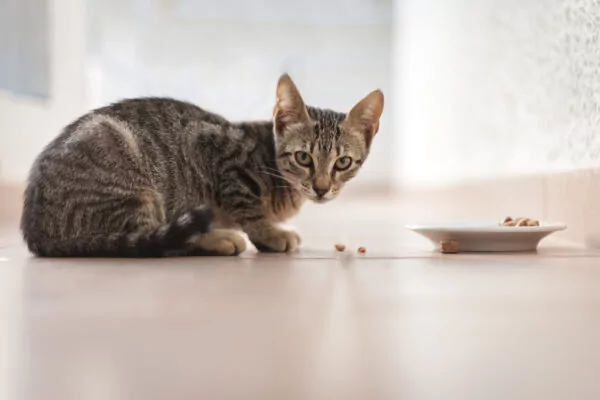
As a pet owner, it can be extremely concerning when your beloved feline friend suddenly loses their appetite. Cats are known for their finicky eating habits, but when your cat isn’t eating at all, it’s time to take action. In this comprehensive guide brought to you by Animal Ark Animal Hospital in Franklin, TN, we will explore the reasons behind a cat’s decreased appetite and what steps you should take when faced with this issue.
Understanding the Importance of a Cat’s Appetite
The Role of Nutrition in Your Cat’s Health
Your cat’s diet plays a crucial role in their overall health and well-being. Proper nutrition is essential for maintaining a healthy weight, strong immune system, and shiny coat. Cats are obligate carnivores, which means their diet primarily consists of animal-based proteins. When a cat refuses to eat, it can lead to nutritional deficiencies and various health problems.
Common Reasons Why Cats Stop Eating
There are several reasons why your cat might suddenly lose their appetite. While some of these reasons may be temporary, others can indicate more serious underlying issues. It’s important to be aware of these common causes:
- Stress or Anxiety: Cats are sensitive creatures, and changes in their environment, routine, or the presence of new pets can lead to stress, which may result in decreased appetite.
- Dental Problems: Dental issues such as gum disease, tooth decay, or mouth sores can make eating painful for your cat.
- Medical Conditions: Underlying medical conditions, including infections, kidney disease, pancreatitis, or gastrointestinal problems, can lead to appetite loss.
- Medication Side Effects: Some medications may cause loss of appetite as a side effect. Always consult with your veterinarian about potential side effects when prescribed medication.
When to Be Concerned About Your Cat’s Lack of Appetite
Normal vs. Abnormal Eating Patterns in Cats
Cats can be picky eaters, and it’s not uncommon for them to skip a meal or two. However, it’s crucial to differentiate between normal and abnormal eating patterns:
- Normal: Your cat skips a meal but continues to show interest in food, is playful, and displays no signs of distress.
- Abnormal: Your cat refuses to eat for more than 24 hours, displays lethargy, hides, or exhibits other unusual behavior.
Signs That Indicate a Serious Problem
If your cat exhibits any of the following signs, it’s essential to seek veterinary care promptly:
- Vomiting or Diarrhea: Frequent vomiting or diarrhea can lead to dehydration and further loss of appetite.
- Weight Loss: A noticeable decrease in your cat’s weight can indicate a severe underlying issue.
- Lethargy: If your cat is unusually lethargic and lacks energy, this could be a sign of a more significant problem.
- Changes in Water Consumption: An increase or decrease in water intake can be a red flag for various medical conditions.

Steps to Take When Your Cat Refuses to Eat
Creating a Comfortable Environment
If your cat has stopped eating due to stress or anxiety, it’s essential to create a calm and comfortable environment for them. Ensure they have a quiet and safe space where they can retreat to if they feel overwhelmed. Providing familiar bedding and toys can also help reduce stress.
Tips to Encourage Your Cat to Eat
- Offer Variety: Try different types of cat food, including wet and dry options, to entice your cat’s appetite.
- Warm the Food: Warming your cat’s food slightly can enhance its aroma, making it more appealing.
- Hand-Feeding: Some cats respond well to hand-feeding. Gently offer small amounts of food from your hand to encourage eating.
- Consult with a Veterinarian: If your cat’s appetite loss persists for more than 24 hours or is accompanied by concerning symptoms, it’s time to consult with a veterinarian.
Consulting with a Veterinarian
When your cat’s lack of appetite continues, it’s crucial to seek professional veterinary care. At Animal Ark Animal Hospital in Franklin, TN, we specialize in feline health and are committed to providing the best care for your beloved pet.
If your cat isn’t eating, it’s essential not to delay seeking professional guidance. Contact Animal Ark Animal Hospital at (615) 778-0880 to schedule an appointment. Our team of experts is here to diagnose the underlying issue and develop a personalized treatment plan to get your feline friend back to their healthy, happy self. Don’t hesitate to reach out for more information or to book your appointment today. Your cat’s health is our top priority.
Recent Posts
Bad Breath a Sign of Disesase
Do you know… that 80% of dogs and 70% of cats over the age of...
- « Previous
- 1
- …
- 11
- 12
- 13
About Us
Animal Ark Animal Hospital offers exceptional, quality pet care with a highly skilled and compassionate staff who understands what a pet means to you and your family.
